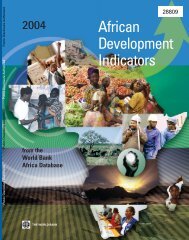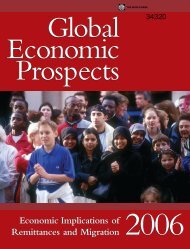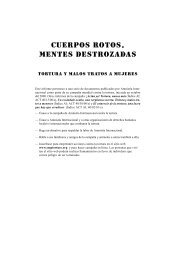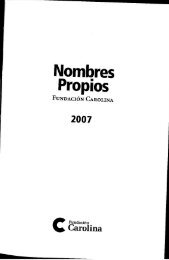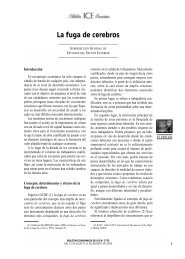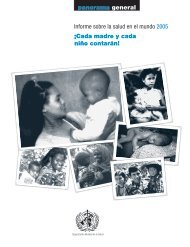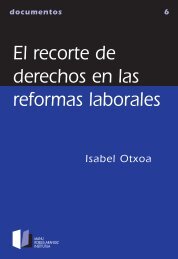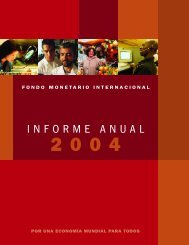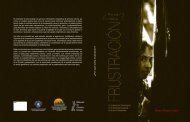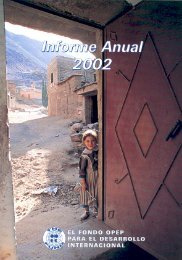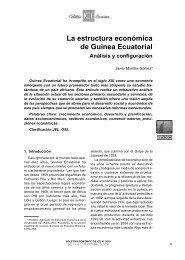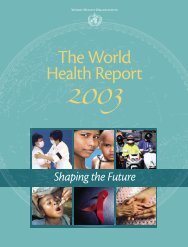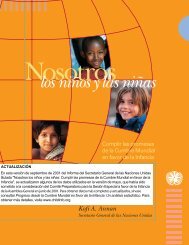Educación para todos: el imperativo de la calidad; Informe ... - eFaber
Educación para todos: el imperativo de la calidad; Informe ... - eFaber
Educación para todos: el imperativo de la calidad; Informe ... - eFaber
- No tags were found...
You also want an ePaper? Increase the reach of your titles
YUMPU automatically turns print PDFs into web optimized ePapers that Google loves.
005440 / ANEXO2<strong>Informe</strong> <strong>de</strong> Seguimiento <strong>de</strong> <strong>la</strong> Educación <strong>para</strong> Todos en <strong>el</strong> MundoFiedrich, M.; y J<strong>el</strong>lema, A. 2003. Literacy, gen<strong>de</strong>r and social agency: adventures in empowerment. Londres,Departamento <strong>para</strong> <strong>el</strong> Desarrollo Internacional (DFID) (Documento <strong>de</strong> educación d<strong>el</strong> DFID, Nº 53).Finnie, R.; Meng, R. 2002. “Minorities, cognitive skills, and incomes of Canadians”. Canadian Public Policy, Vol. 28,págs. 257-273.Fiske, E; y Ladd, H. 2004. “Ba<strong>la</strong>ncing public and private resources for basic education: school fees in post-apartheidSouth Africa” en L. Chisholm (compi<strong>la</strong>dor), Changing c<strong>la</strong>ss: education and social change in post-apartheid SouthAfrica. El Cabo/Londres, Human Sciences Research Council/Zed Press, págs. 57-87.FMI/AIF. 2003. Poverty reduction strategy papers: progress in implementation. Washington, D. C., Fondo Monetariointernacional y Asociación Internacional <strong>de</strong> Fomento.Foster, M. 2004. Accounting for donor contributions to education for all: how should finance be provi<strong>de</strong>d?How should it be monitored? <strong>Informe</strong> final <strong>para</strong> <strong>el</strong> Banco Mundial (documento mimeografiado).Foster, M.; Norton, A.; Brown, A.; y Naschold, F. 2000. The status of sector-wi<strong>de</strong> approaches. Documento marcocadre <strong>para</strong> <strong>la</strong> reunión d<strong>el</strong> Grupo <strong>de</strong> trabajo <strong>de</strong> donantes con afinida<strong>de</strong>s sobre enfoques amplios sectoriales(Dublín). Londres, Overseas Dev<strong>el</strong>opment Institute (ODI).Foucault, M. 2002. Vigi<strong>la</strong>r y castigar: nacimiento <strong>de</strong> <strong>la</strong> prisión. Traducción <strong>de</strong> Aur<strong>el</strong>io Garzón d<strong>el</strong> Camino.Buenos Aires, Siglo XXI Editores Argentina.Freire, P. 1990. La naturaleza política <strong>de</strong> <strong>la</strong> educación. Cultura, po<strong>de</strong>r y liberación. Barc<strong>el</strong>ona, Paidós.Ful<strong>la</strong>n, M. 1993. Change forces: probing the <strong>de</strong>pths of educational reform. Londres, Falmer Press.—. 2000. “The return of <strong>la</strong>rge-scale reform”. Journal of Educational Change, Vol. 2, Nº 1, págs. 5-28.Ful<strong>la</strong>n, M.; y Watson, N. 2000. “School-based management: re-conceptualizing to improve learning outcome”.School Effectiveness and School Improvement, Vol. 11, Nº 4, págs. 453-473.Fuller, B.; y C<strong>la</strong>rke, P. 1994. “Raising school effects while ignoring culture? Local conditions and the influenceof c<strong>la</strong>ssrooms, tools, rules and pedagogy”. Review of Educational Research, Vol. 64, Nº 1, págs. 119-157.Gage, N. 1965. “Desirable behaviors of teacher”. Urban Education, Vol. 1, págs. 85-95.—. 1986. “Comment tirer un meilleur parti <strong>de</strong>s recherches sur les processus d’enseignement?” en M. Crahay,D. Lafontaine (compi<strong>la</strong>dor), L’art y <strong>la</strong> science <strong>de</strong> l’enseignement. Brus<strong>el</strong>as, Labor, págs. 304-325.Gajardo, M.; y Gómez, F. 2003. Social dialogue in education in Latin America: a regional survey. Documentoinformativo <strong>para</strong> <strong>el</strong> Grupo <strong>de</strong> trabajo sobre <strong>el</strong> diálogo social en <strong>la</strong> educación. Comité Mixto <strong>de</strong> ExpertosOIT-UNESCO sobre Aplicación <strong>de</strong> <strong>la</strong> Recomendación r<strong>el</strong>ativa a <strong>la</strong> Situación d<strong>el</strong> Personal Docente, París(Documento <strong>de</strong> trabajo sectorial <strong>de</strong> <strong>la</strong> OIT, en prensa).Gasperini, L. 2000. The Cuban education system: lessons and dilemmas. Washington, D. C., Banco Mundial(Estudios <strong>de</strong> país d<strong>el</strong> Banco Mundial. Colección <strong>de</strong> Publicaciones sobre Reforma y Gestión Educativa d<strong>el</strong>Banco Mundial, Vol. 1, Nº 5).Gauthier, C.; y Dembélé, M. 2004. Qualité <strong>de</strong> l’enseignement y qualité <strong>de</strong> l’éducation. Revue <strong>de</strong>s résultats <strong>de</strong>recherche. Documento <strong>de</strong> referencia <strong>para</strong> <strong>el</strong> <strong>Informe</strong> <strong>de</strong> Seguimiento <strong>de</strong> <strong>la</strong> EPT en <strong>el</strong> Mundo 2005.Gazi<strong>el</strong>, H. 1998. “School-based management as a factor in school effectiveness”. International Review of Education,Vol. 44, Nº 4, págs. 319-333.George, J.; y Quamina-Aiyejina, L. 2003. An analysis of primary teacher education in Trinidad and Tobago.Proyecto <strong>de</strong> investigación multi<strong>la</strong>teral sobre formación <strong>de</strong> docentes (MUSTER), <strong>Informe</strong> <strong>de</strong> país nº 4. Londres,Departamento <strong>para</strong> <strong>el</strong> Desarrollo Internacional (DFID) (Documento <strong>de</strong> educación d<strong>el</strong> DFID, Nº 49e).Ger<strong>de</strong>s, P. 2001. “Ethnomathematics as a new research fi<strong>el</strong>d, illustrated by studies of mathematical i<strong>de</strong>as inAfrican history” en J. J. Saldaña y otros (compi<strong>la</strong>dor), Science and cultural diversity: filling a gap in the historyof science. Mexico, Sociedad Latinoamericana <strong>de</strong> Historia <strong>de</strong> <strong>la</strong> Ciencia y <strong>la</strong> Tecnología (Cua<strong>de</strong>rnos <strong>de</strong> QuipuNº 5, págs. 10-34).Gibbons, M.; Limoges, C.; Nowotny, H.; Schwartzman, S.; y Trow, M. 1994. The new production of knowledge:the dynamics of science and research in contemporary societies. Londres, Sage.Giroux, H. 1993. Living dangerously. Nueva York, Peter Lang.Glewwe, P. 1996. “The r<strong>el</strong>evance of standard estimates of rates of return to schooling for educational policy:a critical assessment”. Journal of Dev<strong>el</strong>opment Economics, Vol. 51, págs. 267-290.—. 2002. “Schools and skills in <strong>de</strong>v<strong>el</strong>oping countries: education policies and socioeconomic outcomes”.Journal of Economic Literature, Vol. 40, Nº 2, págs. 436-482.Glewwe, P.; Kremer, M.; y Moulin, S. 2000. Textbooks and test scores: evi<strong>de</strong>nce from the prospective evaluationin Kenya. Cambridge, University of Harvard Press(http://post.economics.harvard.edu/faculty/kremer/webpapers/Textbooks_Test_ Scores.pdf).



